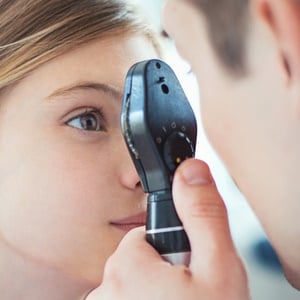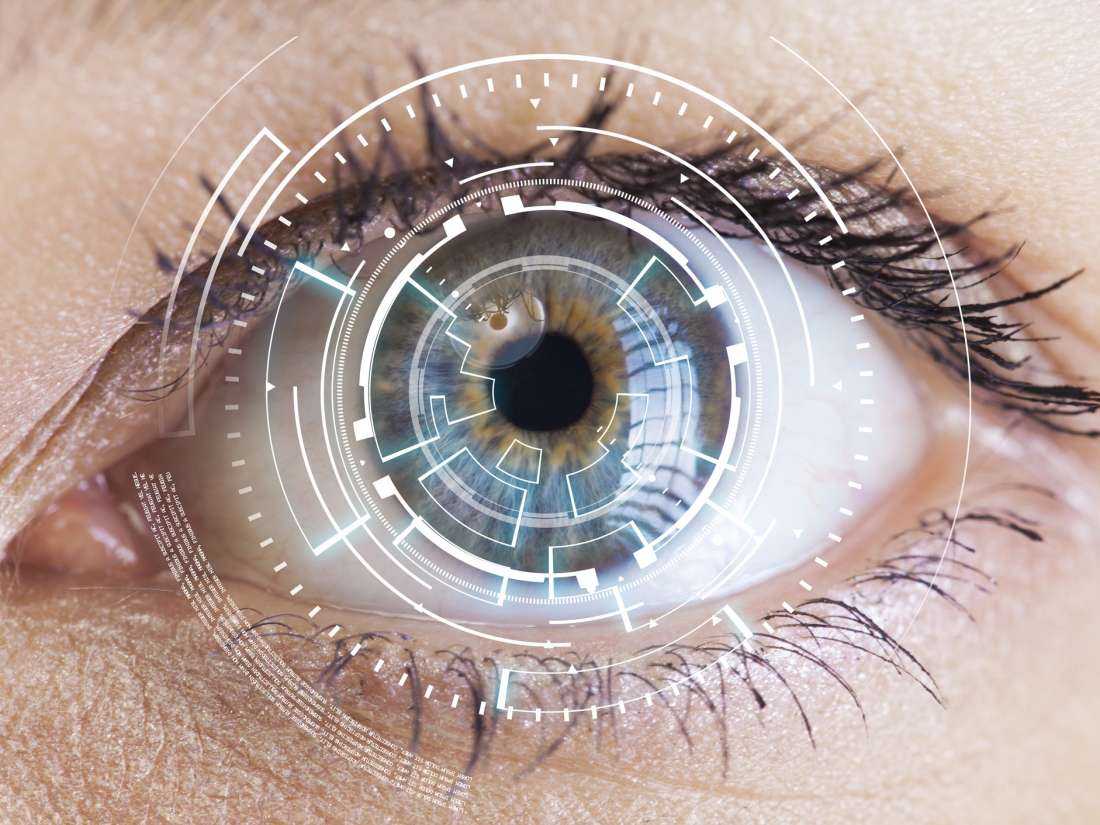When you think of an eye test, you probably imagine getting your vision checked for glasses or contacts. While that's certainly a primary function, what if we told you that a routine eye exam could be a crucial window into the health of your entire body, including your brain? It might sound surprising, but your eyes are far more than just organs for sight; they are intricate indicators of your overall well-being.
Your eyes are windows to the live action of blood vessels, nerves and connective tissues throughout your body. This unique access allows eye care professionals to observe vital components that are often hidden elsewhere. Because of this, problems spotted in the eye are often the first signs of disease lurking elsewhere. This article will delve into how your regular eye test can play a surprisingly significant role in detecting potential brain issues, sometimes even before you experience any noticeable symptoms.
The Eye: A Diagnostic Goldmine
The intricate network of blood vessels, nerves, and tissues within your eyes provides a direct, non-invasive view into your circulatory and nervous systems. This makes the eye a remarkably informative diagnostic tool. The following discusses the reasons why eyes are such a mine of information, the types of conditions that a simple eye test might pick up, and why regular eye checks should be considered a vital element throughout your life.
Beyond simply checking your prescription, a comprehensive eye exam can reveal signs of various systemic health conditions. For instance, regular eye exams can also help detect other medical conditions such as diabetes, high blood pressure, high cholesterol and... even more serious conditions like lymphoma or leukemia can cause changes in the interior of the eye. In some cases, breast cancer and other bodily cancers can metastasize and spread to the eye and its structures. This incredible diagnostic capability extends to the brain, making eye tests a powerful tool for early detection.
Eye Tests and Brain Tumors: A Crucial Link
One of the most significant revelations from an eye exam can be the detection of brain tumors. Yes, eye tests can sometimes detect brain tumours. This isn't just a possibility; it's a reality that underscores the importance of routine check-ups. In fact, they can even spot brain tumours before there are any noticeable symptoms, making routine eye tests a good choice if possible. This early detection can be life-saving.
As Brain Tumour Research, a fundraising and networking organization for brain cancer research based in the UK, states, “a regular, routine eye test can sometimes detect eye problems that indicate the presence of a brain tumor before any symptoms become obvious.” This sentiment is echoed by Dr. Murphy, OD, highlighting the proactive nature of eye care in identifying such serious conditions.
An uncommon, yet potentially fatal, disease that eye care providers can detect during a routine exam is a brain tumor. This is why even if your vision feels perfectly fine, a comprehensive eye health check is invaluable.
How Your Eye Doctor May Spot a Brain Tumor
So, how exactly does an optician or ophthalmologist identify a potential brain tumor during an eye exam? They look for specific changes and indicators:
- Optic Disc Swelling (Papilledema):During this exam, an eye care professional can detect signs of increased intracranial pressure, such as papilledema, which might indicate the presence of a brain tumor. Increased pressure inside the skull, often caused by a tumor, can cause the optic nerve (which connects the eye to the brain) to swell where it enters the eyeball.
- Pressure on the Optic Nerve:During an eye test, an optician can identify a brain tumour by either noticing a swelling of the optic disc or seeing pressure on the optic nerve. Direct pressure on the optic nerve itself can also be a sign.
- Changes in Blood Vessels:Tumors located in the brain can often cause changes in the blood vessels of the eyes, and these changes can be detected during a dilated eye exam. The eye doctor can observe abnormalities in the retinal blood vessels.
- Visual Field Changes:Changes in a person’s visual field, recent double vision, or changes in the size of a patient’s pupil (one pupil may be larger than the other or one may be permanently fixed in size) can all be signs of a potential brain tumor. Tumors in specific brain regions can affect how you perceive your peripheral vision or cause blind spots.
If an eye care provider observes these signs, they will typically refer the patient for further neurological evaluation, such as an MRI or CT scan, to confirm a diagnosis.
Key Eye Exam Components for Detecting Neurological Issues
Here are some key components of the exam that may help detect issues linked to neurological problems:
1. Visual Field Test
This is a crucial test when it comes to detecting brain-related issues. This test evaluates your peripheral vision and detects blind spots or vision loss. Why is this important for brain health? Tumours in certain areas of the brain can impact your field of vision, and visual field tests can highlight these abnormalities. It's a non-invasive way to map out your entire visual range and identify any deficits that might point to a neurological problem.
2. Dilated Eye Exam
During this part of the exam, drops are used to widen your pupils, allowing the doctor to get a much clearer view of the back of your eye, including the retina, optic nerve, and blood vessels. As mentioned, tumors located in the brain can often cause changes in the blood vessels of the eyes, and these changes can be detected during a dilated eye exam.
3. Pupillary Response and Eye Movement Tests
The way your pupils react to light and how your eyes track objects can also provide clues. Abnormalities in pupil size or reactivity, or issues with eye coordination and movement, can sometimes be indicative of neurological conditions affecting the brain's control over these functions.
Beyond Tumors: Other Brain-Related Conditions Eye Tests Can Detect
While brain tumors are a significant concern, eye tests can also provide insights into other serious neurological or vascular issues that affect the brain:
Stroke Risk
Eye care providers can sometimes detect blood vessel blockages in the back of the eye. These blood vessel blockages of the retina can cause sudden blind spots, which may indicate an increased risk for stroke. Especially in seniors, a regular vision exam can help detect a stroke before it happens. Identifying these blockages early allows for interventions that can significantly reduce the risk of a debilitating stroke.
Aneurysms
An aneurysm is a bubble in the wall of a blood vessel that can rupture and cause life-threatening bleeding. While an eye test can't directly "see" a brain aneurysm, the observation of specific changes in the eye's blood vessels or optic nerve, particularly those indicating increased pressure or blood flow issues, can sometimes raise a red flag that prompts further investigation for conditions like aneurysms.
Neurodegenerative Diseases (e.g., Alzheimer's, PCA Syndrome)
Certain neurodegenerative conditions, like Posterior Cortical Atrophy (PCA syndrome), which is a variant of Alzheimer's disease, can manifest with specific visual processing difficulties. While not a direct diagnosis, eye tests can sometimes detect visual problems that are not explained by typical eye diseases like cataracts. If patients are unable to complete the tests, it may signal to their doctor that the reason for their vision problems is not an eye disease, such as a cataract. This can prompt a referral to a neurologist. There are now treatments available for diseases that cause the pca syndrome, such as alzheimer’s disease, emphasizing the importance of early detection.
The Importance of Regular Eye Exams
Given the incredible diagnostic potential of eye tests, it becomes clear why they are so vital. Therefore, it is important to take care of your eyes. Many people only visit the optician when they notice a problem with their vision, but this approach misses the broader health benefits of a routine check-up. My vision is fine, so why do i need an eye health check? Because a sight test is a vital check on the health of your eye, both inside and out.
It can detect a wide range of common eye conditions that on your own, you might not realise you have. Many of these, if found early, can be treated successfully, avoiding potential sight loss. But more importantly, as we've discussed, it can also uncover serious underlying health issues that extend far beyond your eyes. Thus, early detection is even more important than it was even a year ago.
Here are 20 surprising conditions your eye doctor may detect during a comprehensive eye exam, showcasing the breadth of issues that can be spotted. Several health conditions, including brain tumours, can be detected during a routine eye examination. This comprehensive approach to eye care highlights its indispensable role in preventative health.
Conclusion
The human eye is truly a marvel, not just for its ability to perceive the world, but also as a powerful diagnostic tool for our overall health. What might seem like a simple vision check is, in reality, a sophisticated examination that can offer crucial insights into the state of your blood vessels, nerves, and even detect early signs of serious conditions like brain tumors and stroke risk. When it comes to detecting brain tumor early, eye exams can play a crucial role in identifying potential issues.
So, the next time you schedule an eye test, remember that you're not just getting your prescription updated; you're undergoing a vital health check that could potentially save your life or prevent serious health complications. Regular, routine eye tests can sometimes detect eye problems that indicate the presence of a brain tumour. Don't wait for symptoms to appear. Prioritize your eye health, and by extension, your overall health, by making regular comprehensive eye exams a cornerstone of your healthcare routine.
If you, or a loved one, have any concerns about your vision please do not hesitate to contact your local optician to get reassurance and support.



Detail Author:
- Name : Halie Crooks
- Username : treva15
- Email : hand.ferne@hotmail.com
- Birthdate : 1974-12-27
- Address : 619 Maurine Ports Apt. 506 Anastasiamouth, NM 28829
- Phone : +1-678-786-6064
- Company : Hackett Group
- Job : Medical Records Technician
- Bio : Dignissimos possimus voluptatem beatae eum cum asperiores. Unde sit fugit illo quos nihil. Maxime natus excepturi aliquam corporis. Eligendi suscipit aut sapiente voluptas.
Socials
instagram:
- url : https://instagram.com/thalia_mcglynn
- username : thalia_mcglynn
- bio : Laborum sit rerum quia qui voluptas. Rem sequi alias quos aut non quasi.
- followers : 3940
- following : 2761
tiktok:
- url : https://tiktok.com/@mcglynnt
- username : mcglynnt
- bio : Nostrum laborum dolore molestiae ducimus.
- followers : 3111
- following : 60
linkedin:
- url : https://linkedin.com/in/thalia_id
- username : thalia_id
- bio : Ut ipsam neque qui et et molestiae molestiae nam.
- followers : 6907
- following : 2315